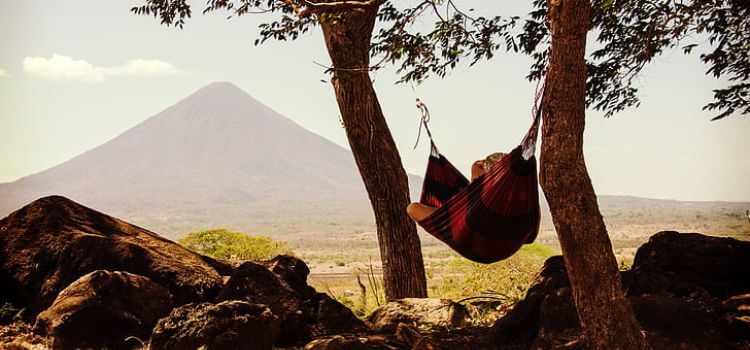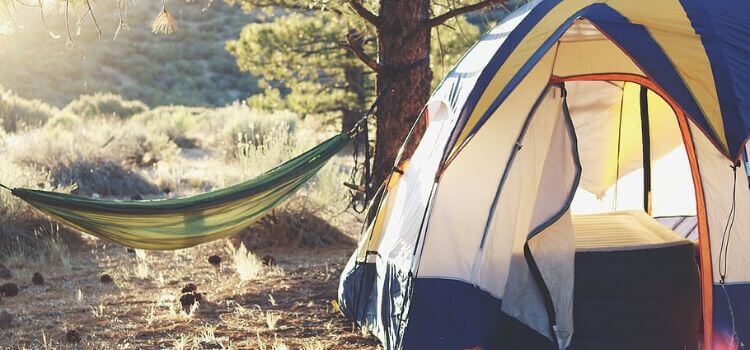As an Amazon Associate, I earn from qualifying purchases
When it comes to camping, choosing between a hammock and a tent depends on personal preference and comfort. A one-person tent provides more room than a hammock, which can feel restricting to some. In this article, we will deeply discuss Hammock vs. tent camping. Let’s begin.
Additionally, a hammock may not offer protection from weather conditions and requires a suitable location for setup. On the other hand, a tent provides more privacy and can be easier to change clothes in compared to a hammock. However, sleeping in a hammock can be safe and may prevent tossing and turning, while also being gentle on the back.
Ultimately, the decision between a hammock and a tent comes down to individual preferences and the specific camping conditions. Let’s learn about the pros and cons of hammock camping vs. tent camping.
Pros And Cons Of Tent Camping

Than in a tent, leading to a better night’s sleep. However, hammocks do lack the weather protection and privacy that tents provide. Ultimately, the choice between hammock camping and tent camping depends on personal preference and the specific conditions of the camping trip.
Pros Of Tent Camping
Tent camping provides a unique experience that appeals to many outdoor enthusiasts. Here are some of the pros of tent camping:
- Spaciousness: A tent offers more space compared to a hammock, allowing you to have enough room to comfortably sleep and move around.
- Protection: Tents provide better protection from the elements, such as rain, wind, and insects. They offer a secure and enclosed space, shielding you from unfavorable weather conditions.
- Privacy: Tents offer a higher level of privacy compared to hammocks. With a tent, you have your own personal space and can fully relax without worrying about prying eyes or distractions.
- Storage: Tents often come with storage pockets and compartments, allowing you to keep your belongings organized and easily accessible.
- Flexibility: Tent camping provides more flexibility in terms of location. You can set up your tent almost anywhere, whether it’s on a campsite or in the wild, as long as it is permitted.
Cons Of Tent Camping
While tent camping has its advantages, there are also some drawbacks to consider:
- Setup Time: Setting up a tent can be time-consuming, especially if you are unfamiliar with the process. It requires assembling poles, securing the rainfly, and staking it down, which can be challenging for beginners.
- Weight and Size: Tents are typically bulkier and heavier compared to hammocks, making them less suitable for backpacking or traveling light. Carrying a tent may require additional effort and space.
- Comfort: While tents offer more space, they may not provide the same level of comfort as hammocks. Sleeping on the ground can be less comfortable, even with sleeping pads or air mattresses.
- Condensation and Moisture: Tents can become damp and accumulate condensation, especially in humid or rainy conditions. Proper ventilation and care are necessary to prevent moisture buildup.
- Environmental Impact: Tents can leave a larger footprint on the environment compared to hammocks. The process of setting up a tent may disrupt the natural surroundings, and the stakes can leave marks on the ground.
Pros And Cons Of Hammock Camping

When it comes to camping, deciding between a hammock and a tent can be quite the dilemma. Both options have their advantages and disadvantages, and it ultimately boils down to personal preference. In this section, we will explore the pros and cons of hammock camping, so you can make an informed decision for your next outdoor adventure.
Pros Of Hammock Camping
Hammock camping has gained popularity in recent years due to its unique benefits. Here are some of the pros of hammock camping:
- Lightweight and Portable: Hammocks are significantly lighter and more compact than tents, making them ideal for backpacking and hiking trips. They are easy to pack and carry during long treks.
- Comfort and Better Sleep: Hammocks provide a suspended sleeping surface that conforms to your body, offering exceptional comfort and support. The gentle sway of the hammock can also lull you into a better sleep, free from uneven or hard ground.
- Quick and Easy Set-Up: Setting up a hammock is quick and straightforward. With practice, you can master the art of hanging a hammock in no time. There’s no need to search for a flat campsite or worry about rocks and roots.
- Elevation and Versatility: Hammocks allow you to sleep off the ground, away from crawling critters, damp soil, and water run-off. They can be set up almost anywhere with the right anchor points, giving you more flexibility in choosing your sleeping spot.
- Great for Warm Weather: In hot and humid conditions, hammocks offer better ventilation and breathability than tents. The open-air design allows for airflow, keeping you cool and providing relief from stuffy tents.
Cons Of Hammock Camping
While hammock camping has its advantages, it also comes with some drawbacks. Here are a few cons of hammock camping to consider:
- Limited Space: Hammocks offer minimal space for storage and movement. Unlike tents, hammocks cannot accommodate multiple campers or provide ample room for gear. If you prefer a spacious camping experience or have a lot of equipment, a tent might be a better choice.
- Weather Vulnerability: Without proper accessories, hammocks are not designed to protect you from heavy rain, strong winds, or extreme cold. You will need to invest in a rainfly or mosquito netting to shield yourself from the elements, adding weight and complexity to your camping setup.
- Learning Curve: Hammock camping requires a bit of practice and skill to ensure a comfortable and safe sleep. Learning how to properly set up the hammock, adjusting the tension, and finding the right angle can take time and patience.
- Availability of Anchoring Points: Hammocks rely on anchor points like trees or rocks to suspend. In areas with limited natural resources or strict camping regulations, finding suitable anchoring points might prove challenging.
- Reduced Privacy: Unlike tents, which provide enclosed spaces, hammocks are open-sided and offer less privacy. If you prefer a more secluded camping experience or need personal space, a tent might be a better option.
Now that you are aware of the pros and cons of hammock camping, you can weigh them against your camping needs and preferences. Whether you opt for a cozy hammock or a traditional tent, the most important thing is to enjoy the great outdoors and make lasting memories.
Frequently Asked Questions Of Hammock Vs Tent Camping
Is It Better To Camp In Hammock Or Tent?
It is better to camp in a tent rather than a hammock because tents provide more room and comfort. Hammocks can feel constricting and may not protect you from the weather. Tents also offer more privacy and are safer if set up properly.
Sleeping in a hammock can be safe and prevent tossing and turning, but it may be colder during winter camping.
What Are The Disadvantages Of Hammock Camping?
The disadvantages of hammock camping are that it doesn’t provide weather protection, requires proper setup, and can be dangerous if not set up correctly. It may also feel confining and restrict movement compared to a tent. Additionally, hammocks tend to be colder in winter and lack the convenience of changing clothes like in a tent.
Is It Ok To Sleep In A Hammock While Camping?
Sleeping in a hammock while camping is safe and comfortable if properly set up. Hammocks offer better support and prevent tossing and turning. However, they may sleep colder than tents during the winter season and lack privacy. Ultimately, it depends on personal preference.
Is It Warmer To Sleep In A Hammock Or Tent?
Hammocks typically sleep colder than tents, which can be an issue in winter camping. It’s harder to change clothes in a hammock compared to a tent. The comfort of a hammock may not be suitable for everyone.
Conclusion
Overall, when deciding between hammock and tent camping, it ultimately comes down to personal preference and specific camping conditions. While hammocks provide a unique and cozy sleeping experience, they lack the protection and spaciousness offered by tents. On the other hand, tents offer more room and are weatherproof, making them suitable for various terrains and climates.
Whether you prioritize comfort, convenience, or versatility, carefully consider your needs and preferences to choose the best option for your camping adventures.
As an Amazon Associate, I earn from qualifying purchases

